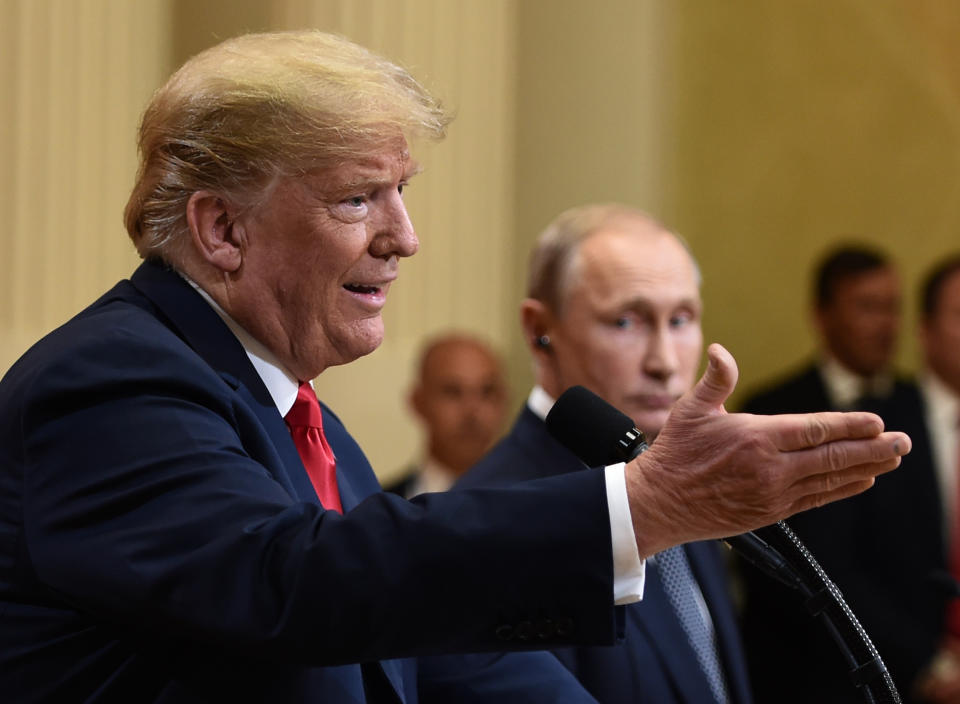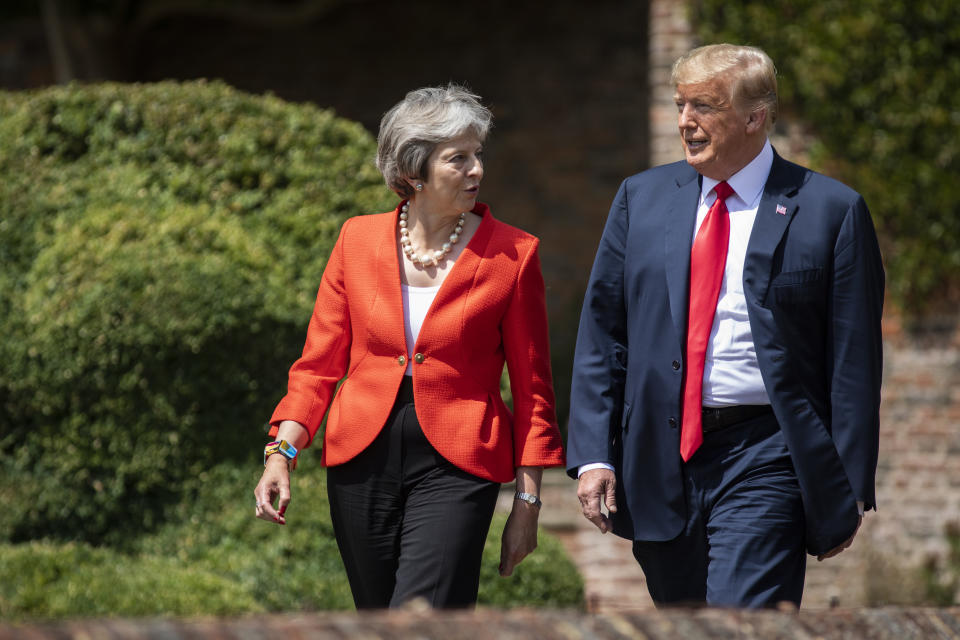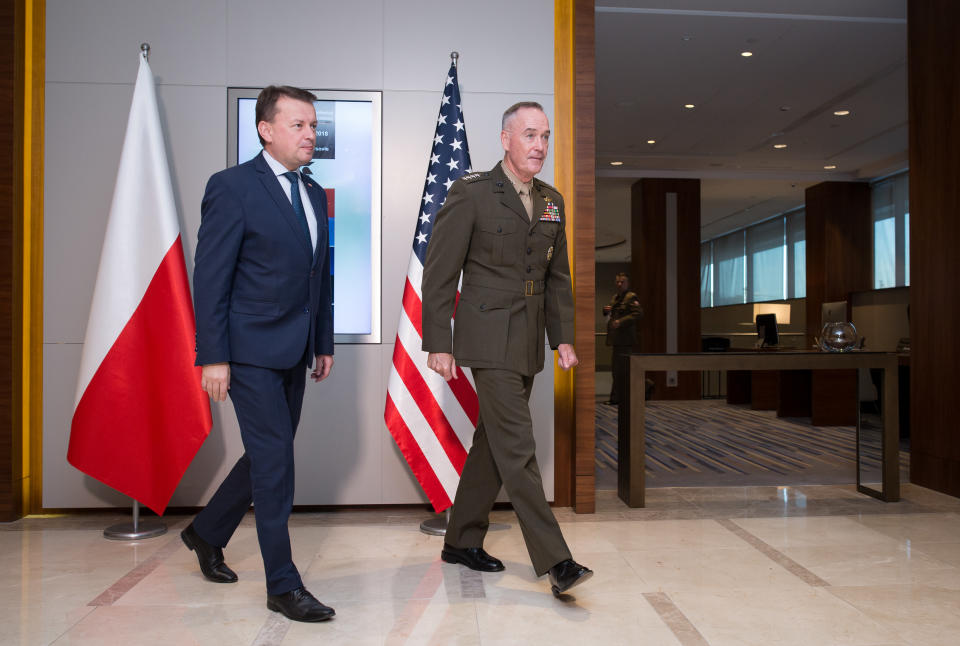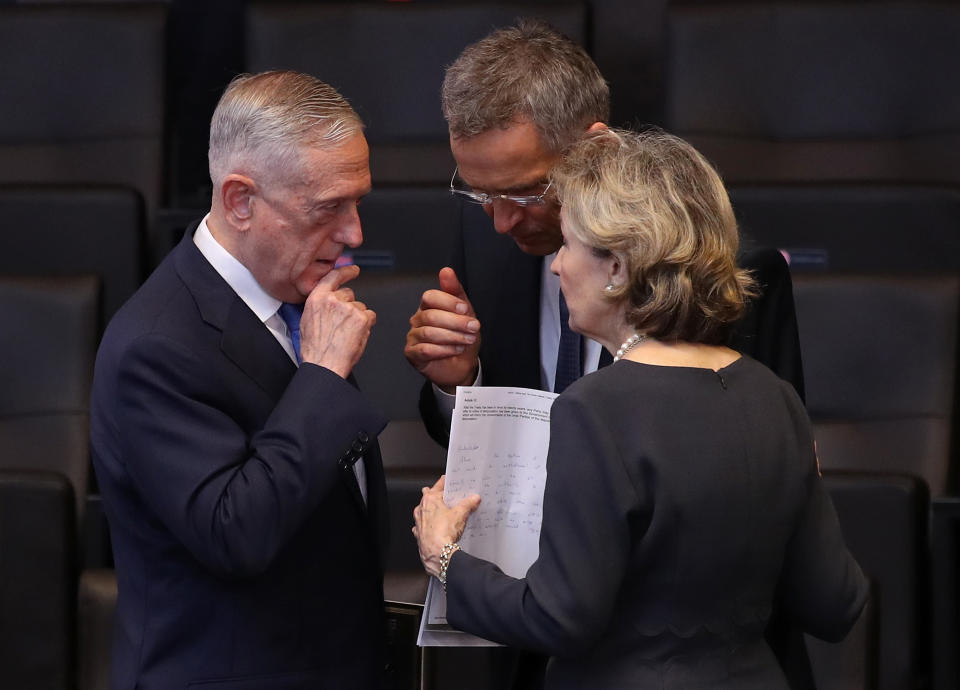In the new cold war, Western democracies are losing ground to Russia

WARSAW – Near the end of September, Gen. Joseph Dunford, chairman of the Joint Chiefs of Staff, and Gen. Curtis Scaparrotti, NATO’s Supreme Allied Commander, Europe, arrived in Warsaw for a meeting with their NATO counterparts as part of a three-nation European visit by Dunford that took him from the alliance’s eastern frontier to the Iberian peninsula. Russia had just completed Vostok-2018, its largest military exercise. The drills showcased a military modernization that Moscow has sustained despite bruising economic sanctions. Military intelligence officers monitored the exercises for signs that they might include field hospitals, a possible telltale indication that the mobilization was more than just a drill. No actual hostilities ensued, but such is the state of distrust today between the Western alliance and Russia.
Military exercises are only the visible part of Russia’s hybrid war on the West, an ongoing destabilization campaign targeting Western democracies. It includes persistent cyberattacks and computer hacking; sophisticated disinformation operations, continued interference in U.S. and European elections and targeted assassinations, such as the attempted murder of a former Russian spy on British soil this year using a Russian-made nerve agent. (On Thursday, the United States and major Western allies announced that seven officers in Russia’s GRU military intelligence agency had been charged with computer hacking in an effort to interfere with the investigation into the poisoning of the Russian defector. Three of the Russian intelligence agents named had been previously indicted for alleged interference in the 2016 U.S. presidential election.)

From the rise of populist, pro-Russian political parties in various countries to the successful campaign for Great Britain to leave the European Union and the Catalonian separatist movement in Spain, Russian efforts at disruption have been surprisingly successful. On the heels of Moscow’s military intervention in Ukraine and forced annexation of Crimea in 2014, this new Cold War has awakened NATO from the long complacency that set in after the collapse of the Soviet Union.
“Russia has studied the United States closely since 1991 [at the end of the Cold War], and they know that our main strategic source of strength is our network of allies and partners, just as they know that our operational source of strength is our ability to project military power,” Dunford told traveling reporters. “So Russia’s strategy is pretty simple: They are trying to erode the cohesion of the NATO alliance and undermine the credibility of the United States in terms of meeting our alliance commitments. They are doing that using cybertools and interference in election and democratic processes … and certainly, in the wake of the 2016 U.S. election and moving into the [midterm] election in 2018, there is a lot of friction in the U.S.-Russian relationship.”
A Shaky Alliance
Despite a growing consensus in NATO counsels about the seriousness of the Russian threat, at every stop on Dunford’s swing through Europe this past week there were unmistakable signs that Russia’s destabilization campaign is working. The picture that emerged was of an alliance besieged as never before in the post-Cold War era. The Western democracies are reeling, not only from Russia’s sophisticated disinformation and cyber-activities but also from the ascendant hardline nationalist movements and “illiberal” political parties that are hostile to the EU, friendly toward Russia — and, in some cases, directly supported by funding from Moscow.
Those far-right populist and increasingly authoritarian parties have gained ground throughout Europe, holding the reins of power in Hungary, Poland and Italy (through a far right-left coalition), and they have made significant gains even in countries such as Germany and Sweden.
At a time of great uncertainty, the Western alliance has also been thrown badly off balance by President Trump’s disruptive leadership. Trump and some of his emissaries to Europe often reflect the anti-immigrant, pro-Russian rhetoric and populist worldview of Europe’s hardline nationalists. Trump’s diplomacy last summer was especially unsettling to the alliance. In a single week overseas, he publicly upbraided close NATO allies and threw a summit in Brussels into disarray; shattered diplomatic protocol by criticizing his London host, British Prime Minister Theresa May; and in an obsequious performance in Helsinki, gave Russian President Vladimir Putin’s denials of election interference weight equal to the conclusions of his own intelligence agencies.
In an interview after returning home, Trump even suggested hesitation about coming to the defense of NATO’s newest member, undermining the alliance’s bedrock commitment that an attack on any member is an attack on all members. In the interview with Fox News days after his private meeting with Putin, Trump was asked why Americans should stand ready to fight for faraway Montenegro, a Balkan republic with a population of less than 700,000.
“I understand what you’re saying. I’ve asked the same question,” Trump replied. “Montenegro is a tiny country with very strong people. … They’re very aggressive people. They may get aggressive, and congratulations, you’re in World War III!”

Until last year, now retired Lt. Gen. Ben Hodges commanded the U.S. Army Europe, and he is now the Pershing chairman in strategic studies at the Center for European Policy Analysis. “NATO is irrefutably the most successful alliance in the world, and the reason is that despite huge arguments and disagreements among the members over the last 70 years, there has never been a doubt about U.S. commitment or the commitment of the other members to the alliance,” he said at a recent conference hosted by the Institute for the Study of War in Washington, D.C. “So when President Trump cast doubt about whether the United States would come to the aid of Montenegro because its people are ‘aggressive,’ that was something I never in my life thought I would hear from an American president. It creates doubt, and that has a negative impact.”
London Bridge falling down
When Dunford arrived in London to consult with his British counterpart in advance of the NATO conference, the major news media in Great Britain were transfixed by the slow-motion train wreck of a potential “hard Brexit.” Since Britain voted to leave the European Union in the summer of 2016, British and European Union officials have been deadlocked over the terms of an orderly exit, with the deadline for leaving fast approaching in March 2019.
Absent a deal for continued British access to Europe’s common market, there are concerns about a mass flight of international businesses, and acute shortages of everything from perishable food to medicine in Britain. A “hard Brexit” could even provoke the unraveling of Great Britain itself, as Northern Ireland chafes at the possibility of more controls on movement and trade across its border with the Republic of Ireland, still an EU member, and a potent, pro-EU Scottish independence movement advocates for another independence referendum.
There is also little enthusiasm for Brexit among most U.S. officials. With Great Britain’s exit, the U.S. loses a valuable bridge to the continent and a like-minded voice in EU counsels. The Brexit chaos has also exacerbated severe defense funding shortages that have already forced the British army to shrink to its smallest size (83,000 troops) since the days of Oliver Cromwell in the 17th century. The British military finds itself so strapped for resources that it will need to borrow a U.S. Marine Corps squadron of F-35 fighters for the 2021 maiden deployment of its new aircraft carrier, the HMS Queen Elizabeth. The U.S. Coast Guard has already loaned the Royal Navy 26 engineers to meet an acute shortage of qualified personnel.

Trump is a well-known supporter of Brexit, however, and this year he even reportedly tried to entice President Emmanuel Macron to also pull France out of the EU.
Trump’s former chief strategist Steve Bannon famously used the Brexit campaign as an early populist template for Trump’s successful 2016 presidential campaign, and more recently he has been in Europe advising nationalist populist parties that are ascendant or in power in Italy, Hungary and even Germany.
There is also growing evidence that Moscow took a direct interest in the Brexit vote. The Times of London has reported on a research project at Swansea University in Wales and the University of California at Berkeley that found more than 150,000 Twitter accounts with ties to Russia tweeted about Brexit in the days before the Brexit vote.
“Brexit has unleashed a lot of centrifugal forces that are pulling at divisions in Great Britain, and making it very difficult for London to focus outward on other foreign policy challenges,” said Kori Schake, deputy director-general of the International Institute for Strategic Studies in London, and a former National Security Council official in the George W. Bush administration. The Trump administration’s recent threats to sanction companies in Britain, France and Germany for doing business with Iran, and thus force America’s closest allies to follow the administration’s lead in abandoning the Iran nuclear deal, is further roiling transatlantic relations at a fraught time.
“If the history of the end of the American century is written one day, President Trump’s performance at the G-7 and NATO summits earlier this year, and his driving our closest allies into the arms of potential adversaries like China and Russia by sanctioning them, are likely to be important milestones,” said Schake. “Trump acts like there is no downside or negative consequences to the chaos he is creating but he is wrong. The United States is increasingly seen as a destabilizing and unpredictable force in international affairs, and that is forcing foreign leaders to make decisions that run counter to our interests.”
On the day Dunford flew from London to Poland, the Times of London published a front-page article about the attempted murder in Salisbury last March of Russian defector Sergei Skripal, who along with his daughter was poisoned with a nerve agent almost certainly made in Russia. The investigative journalism organization Bellingcat revealed that one of the suspects — described by Moscow as an innocent tourist — was actually a highly decorated officer in Spetsnaz, a special forces unit under the command of Russian military intelligence. The disclosure of Col. Anatoliy Chepiga’s identity essentially confirmed the widespread belief among Western intelligence agencies that political assassination is part of Russia’s ongoing destabilization campaign in the West.

NATO Fights Back
In recent years, the government of Poland — one of the Western alliance’s frontline defenders of freedom — has moved alarmingly in the direction of undermining the country’s constitutional democracy. Since taking power, the Law and Justice Party has adopted neighboring Hungary’s model of “illiberal democracy,” curtailing the independence of the constitutional court, politicizing the civil service and wielding public media as an instrument of party propaganda. The scores of Poland and Hungary on Freedom House’s “Freedom in the World” index have both fallen in recent years.
Yet there is something about sharing a border with Russia — and being what a Polish taxi driver described to me as a historic “speed bump” between Berlin and Moscow — that focuses the mind on the business at hand. So when I asked Scaparrotti whether Russia is the Western alliance’s number one national security threat, he didn’t equivocate.
“Yes, absolutely,” he said on the sidelines of last weekend’s NATO conference in Warsaw. Russia is conducting a form of hybrid warfare, he said, just below the level of outright conflict. “If you look at their cyber and social media activity, their disinformation operations, and their money and support to European organizations and political groups on both ends of the political spectrum, they are doing those things in many European countries,” he said. “In my view, they are executing a destabilization campaign based on a strategy that assumes if they can destabilize Western governments it will be to Russia’s benefit. If you look at their military doctrine, that is part of what they call ‘indirect activity.’ They believe undermining Western governments without ever firing a shot achieves their ends.”

Key aspects of Russia’s hybrid destabilization campaign are constant cyberattacks and probes.
“At SHAPE [Supreme Headquarters, Allied Powers Europe], I’m being attacked every day,” said Scaparrotti. “We see attempts to breach our command-and-control and communications systems, both classified and unclassified, on a daily basis. And there is no doubt that some of those cyberattacks are conducted by Russian actors. Without going into details, in some cases, I personally believe those cyberattacks are connected to the Russian state and the state intelligence apparatus.”
While Russia is executing that hybrid campaign in many Western countries, including the U.S., Scaparrotti notes that Moscow’s attacks are focused on NATO’s eastern allies bordering Russia, including Poland and the Baltic states of Estonia, Lithuania and Latvia. According to Bob Woodward’s new book, “Fear,” Russian officials have gone so far as to privately warn the Pentagon that in the event of war involving NATO allies in the East, Moscow would not hesitate to use tactical nuclear weapons.
“The Russians have always seen those countries along the eastern border of the NATO alliance as a region of privileged influence for them, and they want to continue to be able to exert influence there,” he said.
That realization has prompted a dramatic change in NATO’s posture and mindset. Scaparrotti’s staff has spent considerable time and effort dusting off old Cold War concepts such as deterrence, rapid reinforcement and battle readiness. The most tangible sign of NATO’s new mindset was the European Deterrence Initiative, which was established after Russia’s 2014 annexation of Crimea to reassure nervous allies that share a border with Russia. That led to the deployment of four multinational “Battle Groups” to the Baltics and Poland, each led by a “framework nation.” Canada leads the battle group deployed to Latvia; Germany leads in Lithuania, Great Britain in Estonia and the U.S. in Poland.
Late last year, NATO defense ministers also agreed to create two commands to facilitate the rapid reinforcement of Europe in the event of a conflict with Russia. In Warsaw last weekend, senior NATO military officials also discussed at length how to implement the 30-30-30-30 readiness initiative proposed by Defense Secretary Jim Mattis and endorsed at the NATO Summit in Brussels last July. The “4×30” initiative calls for the alliance to have 30 land battalions, 30 fighter squadrons and 30 ships ready to deploy within 30 days of an alert.

“Perhaps the most important thing that has changed is the mindset that we have to get up every day now and be ready to deal with a real threat. That is a fundamental change, and change is the hardest thing for any military organization. Human nature being what it is, we’ve taken a bit of time to get to this point,” said Scaparrotti. “So I think the Russians were ahead of us in terms of changing their posture with respect to NATO. It took the West a little longer to recognize that Russia is not our friend or partner right now and we had better start paying close attention to what the Russians are doing and how they are acting. But I feel like we have the right focus now.”
Spain on Edge
On the last stop of his swing through Europe this week, Dunford stopped in Madrid to consult with his counterpart in Spain. Ongoing combat operations against the Islamic State group (ISIS) and the whereabouts of its foreign fighters was much on the minds of the Spaniards. Last year, a terrorist cell linked to ISIS killed 14 people and injured more than 130 others in Barcelona in the deadliest terror attack in Spain since the March 2004, when Madrid train bombings by al-Qaida-linked terrorists killed 193 people and injured nearly 2,000.
In Madrid, Dunford shared his belief that the Warsaw Summit was one of the most productive in recent memory because leaders are no longer debating the acute nature of the threats the alliance now faces. “When I came into this job three years ago, there was not an appreciation for the challenge that Russia and violent extremism pose to the alliance,” Dunford said. “As a military leader, it’s very easy now because we are no longer having that debate. We have a very clear mandate to adapt NATO to be relevant to the challenges we confront today.”
When I asked Dunford what role, if any, a military alliance like NATO could play to counter the wider instability so evident in Western democracies, he was thoughtful.
“You know, there’s been plenty of periods in the pasts where significant forces were dividing countries, including our own. The confidence I have in our ability to come out of these periods is based on democratic institutions that protect us. At the end of the day, it’s our democratic institutions that provide resilience in difficult times,” said Dunford, who stressed that military-to-military relationships have a stabilizing effect on the broader relationships between nations. “I understand it’s only one part of a broader cultural, economic and political relationship based on shared values and norms, but that military-to-military relationship is important. It’s foundational. So we have to be careful, as military leaders, to maintain a steady course in institutions like the NATO alliance to meet the challenges we face.”
As fate would have it, Dunford’s visit to Madrid this week coincided with the one-year anniversary of Catalonia’s vote last year to secede from Spain, sparking a constitutional crisis. There were protests on the streets of Madrid and more in Barcelona, where 180,000 demonstrators marched — and in some cases clashed — with baton-wielding police.
Spanish intelligence officials confirmed that Russia was using social media, internet bots and trolls, and other disinformation tactics to stoke the Catalonian unrest.
James Kitfield is a senior fellow at the Center for the Study of the Presidency & Congress.
_____
Read more from Yahoo News:
Russian plot to kill defector began with a false story of his death
Facebook accused of conservative bias over Kavanaugh article fact-check
Ten years ago, Washington put politics aside. Could that happen today?

